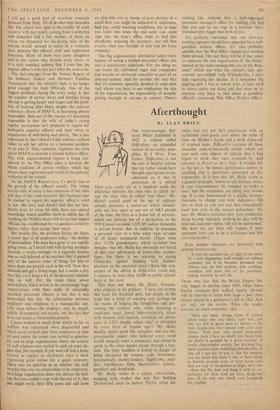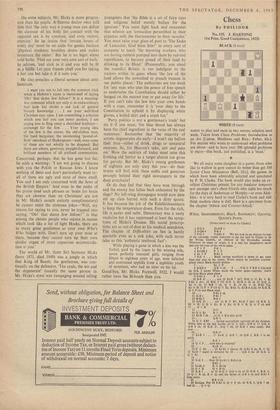Afterthought
By ALAN• BRIEN
THE actor-manager Sey- mour Hicks published in 1922 a volume called Difficulties, an expanded • version of an earlier pam- phlet, If 1 Were Your Father. Difficulties is not the sort of helpful volume that my father would have thought appropriate to me, addressed as it was to gentlemen in a period when you could tell at a hundred yards the difference between the man who is called 'sir' and the man who is called 'you there.' Mr. Hicks's typical pupil at the age of eighteen already possesses a motor-car which immedi- ately sets him apart as one out of 168.3 people of the time. He lives in a house full of servants, which was perhaps less of a distinction, as the 1921 Census recorded 1,335,389 indoor domestics in private houses. But, in addition, he possesses a personal valet at a time when male servants of all kinds numbered 64,443. (There were also 13,336 gamekeepers, which included two females—but Mr. Hicks has obviously not heard of this rare sub-branch of lower-class occupa- tions, for there is no warning to young Chatterley against bedding with feather- pluckers on the ancestral estate.) Bona tide con- sumers of the advice in Difficulties could not, I estimate, be more than 10,000 ex-public school- boys at the most.
This does not worry Mr. Hicks, however, who explains in his preface: 'I have not written this book for financial gain, but simply in the hope that a word of warning may perhaps be the means of helping the thoughtless and pre- venting the reckless, who, while shunning a small-pox ward, knock indiscriminately about with women, and embark, unarmed, on adven- tures in Life's jungle, which alas! is inhabited by every form of human tiger!' Mr. Hicks quickly makes good this metaphor and any im- pressionable reader who believed every word would instantly enter a monastery and refuse to speak to the other monks except through a key- hole. The baby lambkin is hourly in danger of being devoured by women, cads, borrowers, homosexuals, money-lenders, highbrows, paci- fists, republicans, Jews, blackmailers, quacks, gamblers and drunkards. Mr. Hicks writes in a chatty, affectionate, nudging style (rather the way that Bulldog Drummond used to lecture Phyllis when the
swine had not got her) punctuated with an occasional semi-poetic aria about the scent of roses on Mother's hands and a brisk drum-roll of strained puns. Difficulties contains all those muscular man-of-the-world clichds which are now such stale objects of ridicule that I had begun to think they were invented by mild jokesters in Punch or Men Only. A straight left to the jaw is the honest gentleman's .answer to anything that is perverted, subversive or dis- honourable. it is true that Mr. Hicks .states as a general principle, 'unless in self defence, never, in any circumstances, be tempted to •strike a marl,' but the exceptions are many and reveal- ing. If a fake homosexual in a public lavatory threatens to charge you with indecency—'hit him as hard as you can and then immediately hand him over to the nearest policeman.' We have Mr. Hicks's assurance that 'your credentials being beyond reproach, nothing he says. will be believed, and your replies will not be questioned.' (He does not say what will happen, if your opponent turns out to be a policeman and hits you even harder.) Even tougher measures are permitted with genuine homosexuals:
If you arc accosted late at night in the street by a male degenerate, walk straight on without comment; but if he becomes persistent and follows you, hit him anyhow, with anything, anywhere, and leave him on the pavement, hoping sincerely he will die.
Those who fear that the British Empire has only begun to decline since 1945, when those fearful creatures first walked openly .abroad, will be cheered to learn how large a part their threats.played in a gentleman's life in 1922. And not only on the streets. When the reader marries, he must remember, that
There are many strange types of women about today who may desire your wife, and who are just as great pests to society as the male degenerates who consort only with their fellows. That your wife would indignantly dismiss them 1 have no doubt, for, thank God, the world is peopled by a great majority or lovely clean-minded women, but knowing that these wretches have multiplied immoderately of late, all I can say to you is that the moment you arc aware that there is one of them trying to become persona grata in your home—and they are easy of recognition as blight on a rose --show her the door and bang it with no un- certainty, for these kind arc more dangerous than all the men who attack your household put, together.
On some subjects, Mr. Hicks is more progres- sive than his pupils. A famous doctor once told him that 'the only way a young man can defeat the clamour of his body for contact with the opposite sex is by constant, and even violent, exercise.' So he insists that 'certain hours of every day' must be set aside for games because 'physical tiredness banishes desire and makes resistance the easier.' But he is no bigot about cold baths. 'Find out your very own sort of bath,' he advises, 'and stick to it and you will be fit as a fiddle. Let your friends chaff you for taking a hot one but take it if it suits you.'
He also preaches a liberal sermon about anti- Semitism.
I want you not to fall into the common trick when a Hebrew's name is mentioned of 'saying 'Oh! that damn Jew fellow l' It is a meaning- less comment which not only is in extraordinary bad taste but shows a sad lack of gdneral 'history knowledge . . . I see your well-bred Christian eyes open. I am committing a solecism which you feel you can never pardon, I am urging you to fling away a cherished tradition— contempt for the Jew. . . . Your young idea of the Jew is the usurer, the old-clothes man, the hard bargainer, the unrelenting 'pound-of- flesh' merchant of Shakespeare—well, even some of these are not wholly to be despised. But there are others, generous, straight-forward, and brilliant members of all civilised communities.
Concerned, perhaps, that he has gone too far, he adds a warning: 'I am not going to discuss with you the Polish or Russian Jews. I know nothing of them and don't particularly want to: all of them are ugly and most of them smell. You and I are only concerned with the Jews of the British Empire.' And even in the midst of his praise (and such phrases as 'brain for brain they are cleverer than we Christians' are not in Mr. Hicks's mouth entirely complimentary) he cannot resist the clubman jokes—Well, my reason.for saying to you, never be trapped into saying, "Oh! that damn Jew fellow!" is that among the chosen people who rejoice in names which look like a list of light Hocks, there are. as many great gentlemen as your own Who's Who bulges with. Don't turn up your nose at them, because they cannot turn up their own similar organ of more capacious accommoda- tion at you.'
The world of Mr. (later Sir) Seymour Hicks (born 1871, died 1949) was a jungle in which that King of Beasts, the gentleman, was con- tinually on the defensive. 'The cynic, the wit and the degenerate' (usually the same person in Mr. Hicks's eyes) was rampaging around telling
youngsters, that 'the Bible is a set of fairy tales and religious belief merely ballast for the ignorant.' You must fight back and remember that atheists are 'cowardice personified in their pyjamas with the thermometer in their mouths.' You must raise your glass of port to The Duke of Lancaster, God bless him!' in every sort of company to teach 'the wavering workers, who are having rubbish pumped into them by red-tied republicans, to become proud of their land by drinking to its Head.' (Presumably, you stand the rounds.) Britain is too indulgent to the traitors within its gates where `the law of the land allows the unwashed to preach treason in our public places.' The authorities are too weak for 'any man who uses the power of free speech to undermine the Constitution should either be hanged on the nearest tree or put away for life.' If you can't take the law into your own hands with a rope, remember it is 'your duty to the Constitution to uphold it by displaying white gloves, a boiled shirt and a crush hat.'
`Party politics is not a gentleman's trade' but try it if you must, 'for blue blood has always been the chief ingredient in the veins of the real statesman. Remember that 'the majority of artistic degenerates die early—I won't say before their time—either of drink, drugs or unnatural excesses. So, for Heaven's sake, spit and pass on.' How the satirists of today must miss this frothing old horror as a target almost too gross for parody. But Mr. Hicks's young gentlemen of eighteen are only sixty this year—do their brains still boil with these noble and generous precepts behind their rigid newspapers in the deep armchairs?
Or do they feel that they have won through. and the enemy has fallen back exhausted by the siege? No left-wing demagogue would now dare stir up class hatred with such a dirty spoon. It has become the job of the Establishmenteers to keep the temperature down. Even for the rich, life is easier and safer. Democracy was a nasty medicine but it has suppressed at least the symp- toms of Hicks's Disease. His social prescrip- tions are as out-of-date as his medical anecdotes. The chapter of Difficulties on Sex is barely quotable even as a sick joke, with such terror tales as this 'authentic textbook fact': While playing a game in which a kiss was the
forfeit, paid by the losers to the winning side, seven perfectly innocent girls, ranging from fifteen to eighteen years of age, were infected and contracted syphilis from a syphilitic youth of seventeen, who had an ulcer on his lip.
Good-bye, Mr. Hicks. Farewell, 1922. I would rather have the H-bomb than you.







































 Previous page
Previous page